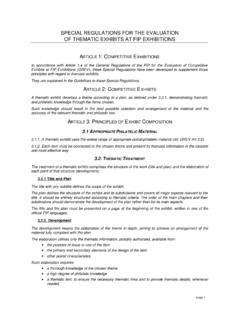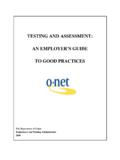Transcription of OWNERSHIP AND CONTROL OF OIL, GAS, AND …
1 OWNERSHIP AND CONTROL OF OIL, GAS, AND. MINERAL RESOURCES IN nigeria : between legality AND legitimacy . LANRE ALADEITAN*. I. INTRODUCTION. Natural resources worldwide are a gift of nature and an endowment of comfort that makes the existence of mankind complete. As nature's priceless gift to man and because nature's endowment of these resources is without reference to people or nation, the subject of OWNERSHIP and CONTROL is one that has generated a great deal of passion and controversy amongst people and nations. Unfortunately, these resources have been identified as playing key roles in triggering conflicts, and, all through history, the struggle for possession and CONTROL of natural resources has been the remote, if not the immediate, cause of great wars and human tragedies.
2 The scramble for partition of Africa at the Berlin Conference of 1884, the Boer wars of South Africa, the institution and sustenance of the obnoxious apartheid system of South Africa, even Hitler's Second World War, apart from its much-vaunted desire to create a master Aryan race, had as its sole motivation the economic domination of Europe by Germany as exemplified by its annexation and conquest of most of Europe. In contemporary times, the desire of the industrialized North in continuing to do business with developing countries, apart from finding sales outlets (markets), is to exploit and take the minerals and natural resources of these countries to their maximum benefit.
3 The possession of mineral resources is therefore crucial to a nation's wealth and well-being. Thus, the OWNERSHIP and CONTROL of such resources are issues that cannot be taken for granted. OWNERSHIP [here implies] the legal right that a legal system grants to an individual in order to allow him or her to exercise the maximum degree of formalized CONTROL over a scarce resource . This idea can be derived from the civil law concept of dominium, the greatest right in property to use and dispose of a thing in the most absolute way alluded to in early * Lanre Aladeitan is a lecturer in the Department of Public and International Law for the Faculty of Law, University of Abuja.
4 160 THURGOOD MARSHALL LAW REVIEW [Vol. 38:159. Roman texts. This concept of dominium is the ultimate right, that 1. which has no right behind it.. On the other hand, the idea of OWNERSHIP , as understood under civil law, has 2. been recognized, to some extent, under common law. For example, [a]ccording to Blackstone, OWNERSHIP could be considered as the sole and despotic dominium of an individual over a thing.. **. [H]owever, [unlike the right of OWNERSHIP under common law, it] is seldom an absolute right. As Mattei notes [c]ommon law countries have been traditionally cautious to emphasize the extent of the owner's powers, always employing the idea of reasonableness to limit him or her in the interest of his or her neighbors.]
5 It is of no surprise therefore that the most important contribution of Anglo-American legal scholarship to property law is the metaphor of the bundle of rights. This clever metaphor defines OWNERSHIP (and property) as a bundle of rights (and 3. duties) enjoyed by an individual over a thing. Following the importance of natural resources as essential commodities, which are at the heart and soul of a nation's economic survival and the definition of natural resource OWNERSHIP as a bundle of rights, different theories of OWNERSHIP and CONTROL of natural resources based on the different nations' political, social, and economic considerations have evolved differently across the world.
6 II. THEORIES OF OWNERSHIP AND CONTROL OF NATURAL RESOURCES (OIL. AND GAS). Although there are varying structures of the theories of OWNERSHIP and CONTROL of natural resources, most of the classifications share similar characteristics. Some of the more common theories are OWNERSHIP in place theory, non- OWNERSHIP theory, qualified OWNERSHIP theory, OWNERSHIP in strata, and servitude theory.. 1. Bryan Clark, Migratory Things on Land: Property Rights and a Law of Capture, ELECTRONIC J. COMP. L. 2, Oct. 2002, (footnotes omitted). 2. UGO MATTEI, BASIC PRINCIPLES OF PROPERTY LAW: A COMPARATIVE LEGAL AND. ECONOMIC INTRODUCTION 77 (2000). 3. Clark, supra note 2, at 2 3.
7 2013] between legality AND legitimacy 161. A. OWNERSHIP in Place Theory The OWNERSHIP in place theory derives from the general common law principle of fee simple absolute and is sometimes referred to as the Fee OWNERSHIP Theory. Under this theory, the owner of a parcel of land has a right to all minerals below the surface of his land that he may work or lease to another. In other words, the OWNERSHIP in place theory is an offshoot of the OWNERSHIP of land in fee simple absolute, which, at common law, meant OWNERSHIP of land to an indefinite extent, upwards as well as downwards. 4 The Latin maxim cujus est solum, ejus est usque ad coelum ad inferos, which literally translates as: to whomever the soil belongs he owns also the sky and to the depth, colourfully describes the indefinite extent of OWNERSHIP in fee simple By OWNERSHIP in place theory, the landowner alone was entitled to deal with the land and dispose of it in accordance with his wishes subject however, to regulatory laws of government or the interest of adjoining land He could, [b]y.
8 Appropriate instrument, [separate] the OWNERSHIP of certain .. rights, powers, privileges and immunities .. from the estate in fee simple absolute in the land. [Thus, b]y an appropriate grant or reservation, one person may be exclusively authorized to drill a well for the purpose of [exploring and producing oil and gas, solid minerals, or other resources,] while another person is [granted] other rights and 7. privileges .. [T]he land owner may [also] grant to another what is described as a 8 9 10. mineral interest,[ ] a royalty interest,[ ] or a leasehold interest;[ ]. 4. PATRICK H. MARTIN & BRUCE M. KRAMER, WILLIAMS & MEYERS, OIL AND GAS LAW.
9 202 (2012). 5. See id. 6. See Marrs v. Comm'n., 177 941, 948 (Tex. 1944). 7. MARTIN & KRAMER, supra note 5, at 201. 8. A mineral right is [a]n interest in minerals in land, with or without OWNERSHIP of the surface of the land. [It is a] right to take minerals or a right to receive a royalty. Mineral Right, THE FREE DICTIONARY, +Right (last visited May 15, 2013). 9. Mineral royalty is the income received from lessees of mineral land. See Logan Coal & Timber Ass'n v. Helvering, 122 848, 850 (3d Cir. 1941). 10. Leasehold interest' means the interest of the lessor or the lessee under a lease contract. 2A-103(1)(m) (2012). 162 THURGOOD MARSHALL LAW REVIEW [Vol.]
10 38:159. alternatively, he may convey the land to another, excepting or reserving from the grant a mineral interest, a royalty interest, or a leasehold interest. 11 The implication of the OWNERSHIP in place theory is that the landowner owned the land and the resources beneath his land absolutely and could confer separate titles to them by reservation, separation, or severance. In this theory, the landowner can sever the surface rights12 from the mineral rights and grant the latter in perpetuity and in fee simple,13. either through sales or reservation. The rationale for this theory is that oil, gas, and solid minerals in the soil are a part of the real estate of the land owner, who has the right to sell, lease, or use the property in any lawful way as the incidence of OWNERSHIP will The OWNERSHIP in place theory enjoys wide recognition and application in many states in the United 15.






